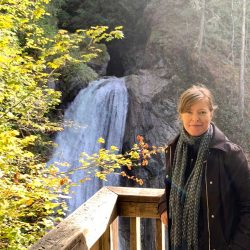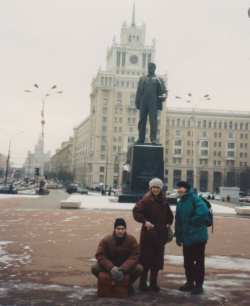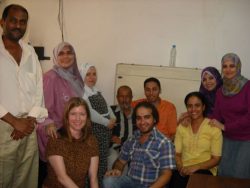Q&A with Joanne Walby, Communications Manager

Why did you decide to join Washington STEM?
Fairness has always been important to me—maybe because I grew up in a big family. As an adult, I know that fairness can be elusive and I want to work to level the playing field. Before coming to Washington STEM, I used my communications skills to support immigrants and refugees as they told their stories and adjusted to life in the Puget Sound. I saw how they had to work extra hard to find a job, housing, and connect to community. I also met immigrant youth who were succeeding despite the obstacles of learning a new language and adjusting to a new culture. I noticed that for many of them, STEM education was a way up. So, when a position at Washington STEM opened up, I applied.
What do equity in STEM education and career mean to you?
What I keep coming back to is my Physics class during senior year of high school. After struggling for years in math classes, I was absolutely fascinated by physics, and the Law of Conversation of Matter. But without a strong math background, I didn’t seriously consider studying STEM fields. And since I loved to read and write, the social sciences was the clear choice. Although I love connecting systems level work through narrative and storytelling— looking back I wonder what a little encouragement (and some serious math tutoring) might have allowed me to do. To me, equity in STEM means that the teachers and adults get to know their implicit biases so girls are encouraged rather than self-selecting out of STEM classes.
Why did you choose your career?
I’ve always loved reading and writing. When I was 12 my family hosted a Japanese exchange student who taught me and my sisters to count to 100 in Japanese. From then on, I was hooked on learning languages, too. Despite having a fantastic Algebra teacher in high school (shout out to Father Fred at Bellarmine in Tacoma, who, with his horseshoe mustache, chained wallet and gruff voice looked more like a biker than a Jesuit priest), I studied Russian and Spanish in high school and spent six weeks one summer with a host family in Salamanca, Spain. In college, I was intrigued by political economics and ended up with a degree in International Studies so I could better understand systemic levers that shape our lives—that is, policies, laws, institutions—and how we can adjust them to create a more just society. As one of my new Washington STEM colleagues said about systems-level work, “This work is messy—and beautiful.” And, as a writer, I get to help tell that story.

Can you tell us more about your education/career path?
Somewhere around 13 I became obsessed with the Second World War—so much so that when I saw a history atlas at Costco about the war, I asked for it for Christmas. I grew up in the 80s during the Cold War and I wanted to understand how we ended up so divided. I studied Russian in high school and at the University of Washington and I spent a year studying abroad in Russia during the “wild west” years of the 1990s. A few years later, I got a job at the American Bar Association in Washington, D.C. supporting legal reform in the former Soviet republics. Eventually, I understood that there was a big piece missing from the Cold War’s binary view of the world: the non-aligned Global South. When I decided to pursue a master’s degree, I went to American University in Cairo that provided a more nuanced view than what I was seeing in Washington, D.C. I ended up studying recent migration between Russia and the Middle East, and later wrote for a business magazine in Cairo. I was there during the Arab Spring, which gave me a profound appreciation for democracy and how fragile it is, and how terrifically difficult it is to restore once it’s lost. When I returned to US, I started working as a communications officer at Refugee Women’s Alliance.

What inspires you?
I also get inspired by thinking about Time: it feels eternal yet fleeting. And I like to remember that I am standing on the shoulders of those who came before me, and that my work may support future generations, too. That’s why Washington STEM’s mission to open opportunities for all students—especially students of color, girls, those in rural areas or experiencing poverty—is so important.
What are some of your favorite things about Washington state?
Being surrounded by incredible landscapes: from the rain forests to the Gorge, from the Okanogan’s high desert sage, to the San Juan Islands, and the sharp outcrops of the Northern Cascades. But I also love how many Washingtonians are open to innovation, and willing to examine the past, even when it is painful, so we can create a society where everyone belongs. When we do this, we can inspire others to follow.
What’s one thing about you people can’t find through the internet?
I lived in the Okanogan for a year and absolutely loved it. It feels physically (and spiritually?) different up in the high desert.
